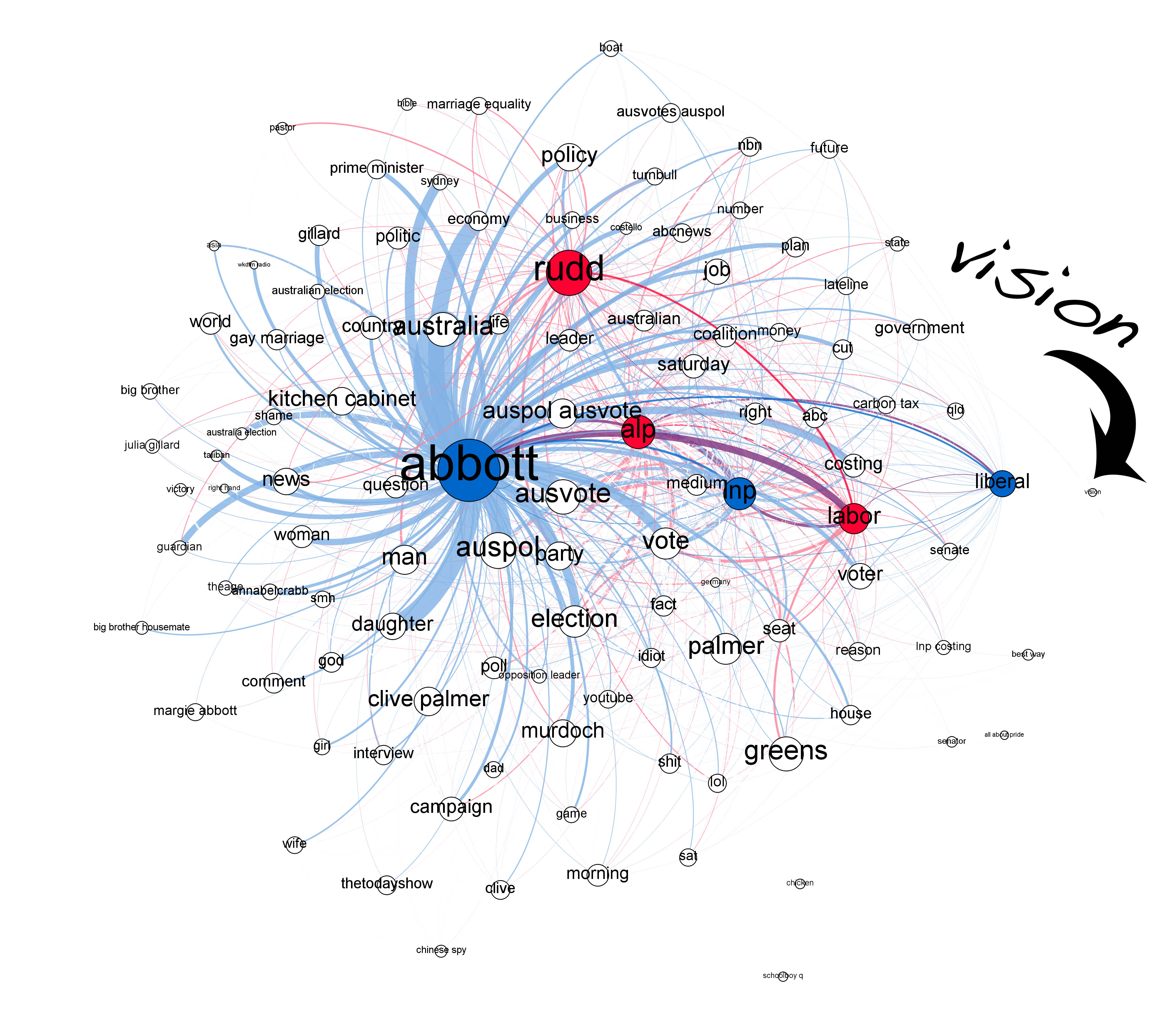Ambassador Chris Eigeland on the upcoming Australian election and the social data analysis behind it.
Follow Chris on Twitter:
In 2007, Kevin Rudd and the progressive Labor party swept to power on the back of a savvy, youth-driven social media campaign entitled Kevin07. Three years later, unprecedented for a first term Prime Minister, he was unceremoniously deposed for our first female Prime Minister, Julia Gillard. Surviving the 2010 election by the skin of her teeth, she hung onto power with a hung parliament through an agreement with two independents and the Greens.
The conservative opposition and its leader Tony Abbott maintained a relentlessly negative and vitriolic commentary on Gillard’s performance – you may remember the now-viral ‘misogyny’ speech given by Gillard that resonated around the world. The attacks were so effective that Gillard struggled to stay on her message of reform and was removed weeks before the current election. For the second time, a sitting Prime Minister was replaced.
Kevin Rudd was reinstated and immediately attempted to rebrand himself and his vision for the top job. Understandably, Rudd wants Australia to look forward to the future and concentrate on the ‘new way’, ignoring the turbulent past. So far, it’s all about Kevin Rudd, volunteers decked out in ‘Kevin’ shirts with minimal party branding hand out campaign leaflets based on the foundation of ‘fearing’ Abbott, arguing that ‘if he wins, you lose’.
With the major parties finding common ground on issues such as education, the national disability scheme and shifting to the right on asylum seeker policy, there is an unrestrained contest now focused on character. This campaign has cemented Australia’s drift towards the US Presidential style race. Previously, policies and parties were the center of the conversation, but today it is about projecting personalities, snappy slogans and advertising the opposition’s gaffes. The party leaders dominate everything, making virtually all announcements while the front-benchers are wheeled out on comedy and music shows.
Importing three digital specialists from Team Obama, Labor is pushing its social media presence and enthusiasm to the extreme. Rudd even emulated Obama by participating in a Reddit ‘Ask Me Anything’, where he coined a new nickname of ‘Krudd Dog’. But with everyone able to broadcast their opinion on social media, do the conversations taking place reflect the emphasis placed on social media in this election?
Tony Abbott and the conservative coalition come across as more digitally naïve. More like a dorky dad that just does not quite get it. But outside the carefully scripted speeches and the rare policy announcements, what are the people of Australia saying? And who out of Tony Abbott and Kevin Rudd is actually breaking through in the social media dialogue?
Putting this to the test, The GoCatalyze team ran an analysis of all recent Tweets around the upcoming Australian election, exploring which words were linked to the two ‘presidential’ candidates. We coloured the leaders and their party (Kevin Rudd and Labor, and Tony Abbot and the Coalition) blue and red respectively. It reveals an interesting story - and a pretty picture.
[[[image-0 large]]]
Above: Twittersphere for the Australian election in the last week of campaigning. Sizes of the nodes represent the frequency of discussion. Thickness of lines are proportional to the strength of the link.
Abbott, despite having a much smaller Twitter following than the social media heavyweight Rudd appears to be heading for victory, at least in the number and types of conversations he dominates. He is more strongly associated with mentions of victory and prime minister than the Prime Minister himself. However, reflective of the style of personality-politics, he is more closely associated with his daughters than with his management of the economy. This is not just the case on Twitter and he has frequently promoted his daughters actively at campaign events and most recently in an awkward pitch to the Big Brother television housemates for votes.
From the Labor Party, Kevin Rudd, an experienced diplomat, has a stronger link to policy, though it seems mostly about exploiting his opponent’s more antiquated views on marriage equality. Again, this is playing on the politics of fear, if Abbott wins, Australia loses.
Where this election race gets interesting is in the players on the periphery, both in alternate candidates and external entities such as the media. Our twerking candidate, mining billionaire Clive Palmer, provides controversy and comic relief, and perhaps fittingly is commonly associated with lol. Outside of his pursuit of the Prime Ministerial office, he is building a Jurassic Park themed resort and a second Titanic. And we all know how well those ideas ended previously.
Media mogul Rupert Murdoch, owner of News Corp (which includes Fox, The Wall Street Journal and the former News of the World), is intimately associated with the term game in the Twittersphere. Perhaps in recognition of his open and relentless pursuit of an Abbott victory on Saturday, he is implementing a strategy to ‘throw this mob out’, as one of his tabloids declared on the front-page the morning the election was called.
In a campaign heavily focused on persona, disappointingly, but again not surprisingly, vision is orphaned from the conversation, and there are tenuous links to future.
Hopefully once the campaign rhetoric has died down, there can be more focus on these conversations and less concern with the trivia, and karaoke.
